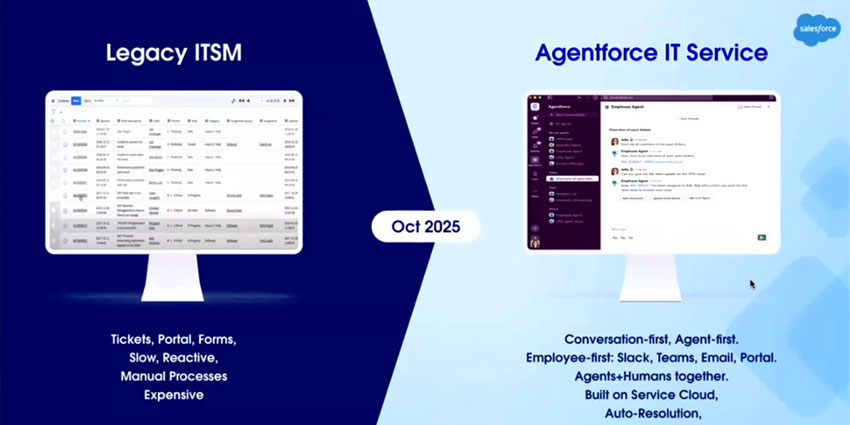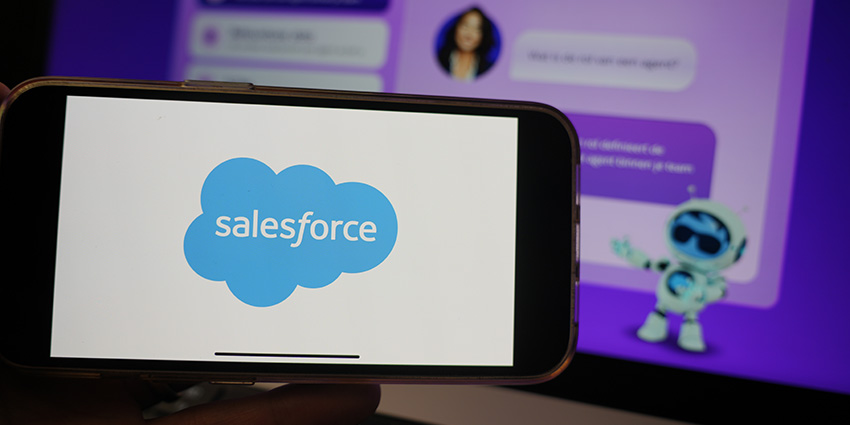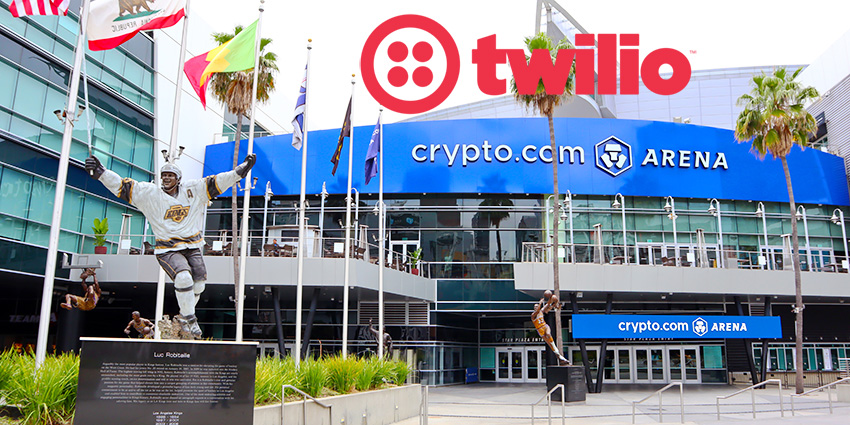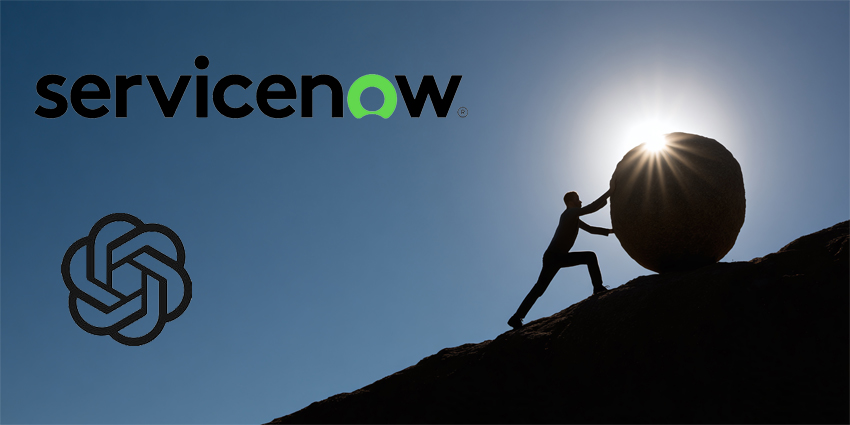Salesforce has launched its new IT service management (ITSM) product: Agentforce IT Service.
ITSM solutions help IT teams manage the services they offer across the enterprise. That includes troubleshooting, configuring devices, running applications, granting access to them, and more.
As teased last month, Agentforce IT Service will become a key fixture of Service Cloud, as Agentforce for HR Service did in May earlier this year.
HR Service solutions similarly support issue resolution, handle requests for vacation, update employee personnel details, and more.
With these two additions, Service Cloud is suddenly much more than a customer support application; it’s a full-scale service platform.
That’s a critical differentiator that Kishan Chetan, EVP and GM for Service Cloud at Salesforce, stressed when answering how Agentforce IT Service can have success in an already consolidated ITSM market, led by ServiceNow.
“Everything we’ve created lives on one unified platform,” said Chetan.
“That means your data, configurations, agents, and workflows all work seamlessly together, across Slack, Teams, Google, or any other interface.
Other solutions often have separate platforms for employees and fulfillers, creating integration overhead. Salesforce removes that friction.
ServiceNow may soon contest this, as it rolls out its new AI Experience offering. Nevertheless, Chetan highlighted other differentiators, starting with its native Agentforce agents embedded at the Agentforce IT Service solution’s core. As the vendor claims, it’s not a legacy system retrofitted for AI.
Additionally, Chetan highlighted the widespread adoption of Service Cloud, with 60,000 customers. That’s considerably more than ServiceNow, which Salesforce estimates to have approximately 9,000.
Salesforce hopes that many of its 60,000 customers will turn on Agentforce IT Service after the “great success” of Agentforce for HR Service and its vision for the future of ITSM.
Per Chetan, that vision hones in on two “significant opportunities” for disruption:
- Employee-Centric Design — The Salesforce man says customers want personalized service experiences. He believes Salesforce is uniquely positioned to deliver that, with Data Cloud at its core, and a close tie-in with Slack.
- Conversational Service Transformation — The market is shifting from traditional portals and tickets to AI-driven, conversational experiences that resolve issues in real time. Agentforce IT Service will automatically identify the root cause of an issue by referencing historical tickets and knowledge base content and suggest a resolution.
Sharing more on the go-forward, Chetan said: “Over the next 12–18 months, we’ll focus on customer success, trust, and innovation, ensuring customers see tangible ROI from day one.
“We’re investing in domain-specific packs for IT, expanding our partner ecosystem, and continuing to deliver on our aggressive product roadmap.”
What Does Agentforce IT Service Include?
At launch, Agentforce IT Service comprises four core functional areas, as laid out below.
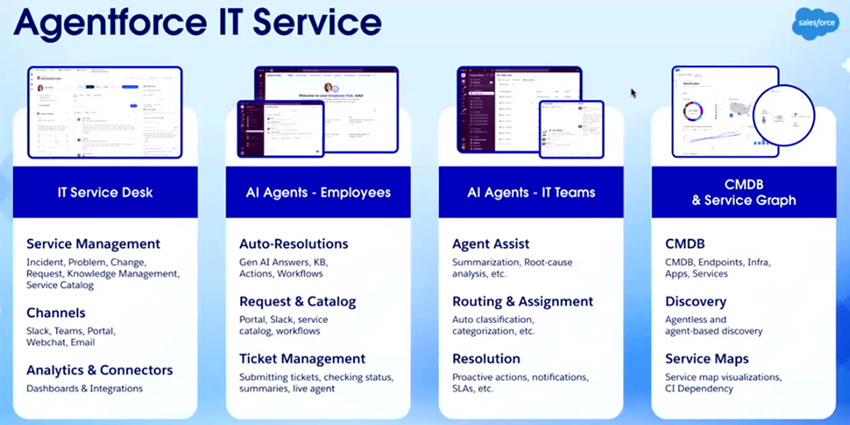
1. An IT Service Desk
This is the core end-to-end service management function, including incident, problem, change, release, and request Management, plus a unified Service Catalog. It also includes connectors, integrations, analytics, and dashboards, everything IT teams need to automate manual work.
2. AI Agents for Employees
Salesforce promises multi-agent support that not only resolves queries by drawing from knowledge articles but can be configured to automate cross-system resolution flows, enabling employees to open, track, and resolve tickets more easily.
3. AI Agents for IT Teams
IT teams get AI agents for summarization, root-cause analysis, routing, classification, and proactive incident management, with the latter empowering them to predict and prevent issues before they escalate.
4. Configuration Management Database (CMDB) & Service Graph
This is the intelligence layer connecting applications, infrastructure, and services across the organization. It supports root-cause analysis, dependency mapping, and configuration management, all aligned with IT compliance and best practices.
The Salesforce-ServiceNow Rivalry Expands Beyond CRM
Many will label Salesforce’s move as a snap back at ServiceNow, which hasn’t made any secret of its long-term ambition to overtake the company as CRM market leader.
The companies are also battling it out to be many enterprises’ AI agent platform of choice.
Nevertheless, the move aligns closely with Salesforce’s ambitions to unify customer, employee, and IT support on one platform, and this is a noble aim.
After all, every form of support shares the same core goal: resolving issues. Providing a single, unified structure for doing so, across the entire business, and consolidating all resolution data in one place will break down silos and strengthen future problem-solving.
Meanwhile, working from the same platform may help bridge the gap between customer-facing and IT teams as they collaborate on developing next-generation service experiences.
With IT playing a much more significant role in AI procurement, that close connection may also have several other major benefits.
Salesforce is calling on its ecosystem to accentuate these, with 100+ partners for Agentforce IT Service at launch, covering integrations, connectors, and managed services.
It has also introduced “Light Up the Org”, which helps partners show customers, using their own data, what the IT service experience will look like on day one, even before purchase.
On the ISV (independent software vendor) side, partners can build connectors and integrations that enhance workflows and agents.
Meanwhile, on the services side, resellers and implementation partners can deliver setup, customization, and managed services.
As Muddu Sudhakar, Senior VP & GM for IT and HR Service at Salesforce, summarized: “Our goal is to win one customer at a time, together with our partners.”
Expect to learn more about Agentforce IT Service at next week’s Dreamforce event. Preview the event here.
